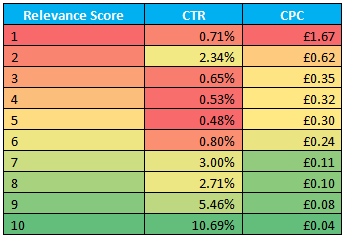Facebook is always aiming to show their users the ads that are most pertinent to them. Therefore it takes into account the relevance of the ads before deciphering when and where to show them. In turn, this should lead to a better overall experience for their users.
How does it work?
Relevance score is based on the positive and negative feedback that Facebook expects an ad to receive. If an ad is expected to get positive engagements then the relevance score should increase. The score is between 1 and 10, 10 being the highest. It is most relevant to ads that are paying per click rather than for reach and frequency for brand awareness campaigns. In order to predict this, Facebook takes into account a synthesis of many metrics: Clicks, Conversions, Click-Through Rate, Negative Reviews and Engagement. Without decent results for these metrics, it will become very costly to advertise.
What do I get in return?
Like Google’s Quality Score, the higher the score, the lower the cost per results and also the increased likelihood that your ad will be shown over another advertiser. Please note, that unlike Google’s Quality Score, these ads are based on relevance, not quality. So, your ads can be visually appealing however, if you’re advertising premium handbags and you’re targeting males ages 14-18 then your relevance score is going to be significantly lower and will cost you significantly more for each result.
Please see below the impact that a high relevance score has had on one of our client’s Click-Through rate and Cost per Click:


As you can see, by achieving a relevance score of 10, we’ve tracked a 97% decrease in Cost Per Click and a staggering 9.98% difference in Click-Through Rate.
It goes without saying that if your ads are shown to the right targeted audience then it will receive a good CTR and engagement. In turn, this will lead to a lower CPC and higher relevance score.
What steps can I take to improve my ad’s Relevance Score?
Split Testing: Facebook makes it super easy to experiment with different ads and audiences to allow you to refine and optimise to your target ROI. For more information on how to split test your audiences in Facebook please see our blog post.
Focused Targeting: Facebook, over any other platform, has laser targeting, use it to your advantage, but first, identify your user buyer persona; understand their problems & their needs before creating your ads. This may seem obvious, but this is often bypassed.
Frequency monitoring: Sometimes showing your ads too frequently can be detrimental to your campaigns. If you would like to run your ads at a high frequency then refresh your creatives regular to keep your audience engaged and interested.
Overall, whilst Facebook relevance score can seriously improve a campaign’s performance, I wouldn’t get too obsessed because, at the end of the day, you’re advertising to make money. A low relevance score generally means that you could probably do better, but not that you should stop altogether, especially if you’re still seeing a decent return.